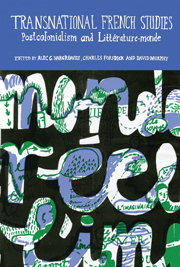Book contents
- Frontmatter
- Contents
- Acknowledgements
- Introduction: What Does Littérature-monde Mean for French, Francophone and Postcolonial Studies?
- From World Literature to Littérature-monde: Genre, History and the Globalization of Literature
- Postcolonialism, Politics and the ‘Becoming-Transnational’ of French Studies
- Mapping Littérature-monde
- Afterword: The ‘World’ in World Literature
- Appendix: Toward a ‘World-Literature’ in French
- Notes on Contributors
Appendix: Toward a ‘World-Literature’ in French
- Frontmatter
- Contents
- Acknowledgements
- Introduction: What Does Littérature-monde Mean for French, Francophone and Postcolonial Studies?
- From World Literature to Littérature-monde: Genre, History and the Globalization of Literature
- Postcolonialism, Politics and the ‘Becoming-Transnational’ of French Studies
- Mapping Littérature-monde
- Afterword: The ‘World’ in World Literature
- Appendix: Toward a ‘World-Literature’ in French
- Notes on Contributors
Summary
In a manifesto published in Le Monde in 2007, forty-four writers – among them Tahar Ben Jelloun, Maryse Condé, Édouard Glissant, and J.-M. G. Le Clézio – declared the death of Francophone literature and the birth of ‘world literature in French’. In February 2009, at an international conference (‘Littérature-monde: New Wave or New Hype?’) held at Florida State University, Azouz Begag and several of the original signatories – Michel Le Bris, Alain Mabanckou, Anna Moï, Jean Rouaud and Abdourahman Waberi – continued the debate.
In due course, it will perhaps be said that this was a historic moment in autumn 2006, five of the seven French literary prizes – the Goncourt, the Grand Prize for Novels of the Académie Française, the Renaudot, the Femina and the Goncourt for High School Students – were awarded to foreign-born writers. A random coincidence, among publishers' fall catalogs, uniquely concentrating talent from the ‘peripheries,’ a random detour before the channel returns to the riverbed? A Copernican revolution, rather, in our opinion. Copernican because it reveals what the literary milieu already knew without admitting it: the center, from which supposedly radiated a franco-French literature, is no longer the center. Until now, the center, although less and less frequently, had this absorptive capacity that forced authors who came from elsewhere to rid themselves of their foreign trappings before melting in the crucible of the French language and its national history: the center, these fall prizes tell us, is henceforth everywhere, at the four corners of the world.
- Type
- Chapter
- Information
- Transnational French StudiesPostcolonialism and Littérature-monde, pp. 296 - 300Publisher: Liverpool University PressPrint publication year: 2010

